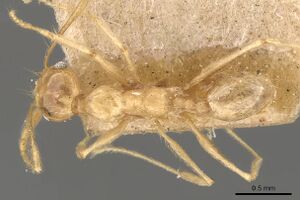Pheidole lemur
| Pheidole lemur | |
|---|---|

| |
| Scientific classification | |
| Kingdom: | Animalia |
| Phylum: | Arthropoda |
| Class: | Insecta |
| Order: | Hymenoptera |
| Family: | Formicidae |
| Subfamily: | Myrmicinae |
| Tribe: | Attini |
| Genus: | Pheidole |
| Species: | P. lemur |
| Binomial name | |
| Pheidole lemur Forel, 1912 | |
Nothing is known about the biology of lemur.
Identification
See the description in the nomenclature section.
Keys including this Species
Distribution
Only known from the type locality.
Latitudinal Distribution Pattern
Latitudinal Range: -1.456° to -31.632389°.
| North Temperate |
North Subtropical |
Tropical | South Subtropical |
South Temperate |
- Source: AntMaps
Distribution based on Regional Taxon Lists
Neotropical Region: Brazil (type locality).
Distribution based on AntMaps
Distribution based on AntWeb specimens
Check data from AntWeb
Countries Occupied
| Number of countries occupied by this species based on AntWiki Regional Taxon Lists. In general, fewer countries occupied indicates a narrower range, while more countries indicates a more widespread species. |

|
Estimated Abundance
| Relative abundance based on number of AntMaps records per species (this species within the purple bar). Fewer records (to the left) indicates a less abundant/encountered species while more records (to the right) indicates more abundant/encountered species. |

|
Biology
Castes
Worker
Minor
Images from AntWeb
   
| |
| Paralectotype of Pheidole lemur. Worker. Specimen code casent0908223. Photographer Will Ericson, uploaded by California Academy of Sciences. | Owned by MHNG, Geneva, Switzerland. |
Nomenclature
The following information is derived from Barry Bolton's Online Catalogue of the Ants of the World.
- lemur. Pheidole lemur Forel, 1912f: 225 (s.w.q.) BRAZIL. See also: Wilson, 2003: 204.
Unless otherwise noted the text for the remainder of this section is reported from the publication that includes the original description.
Description
From Wilson (2003): A small, yellow member of the diligens group whose major is notable for its long propodeal spines, very sparse pilosity, mostly smooth and shiny body surface (but with partially shagreened first gastral segment), and small patch of rugoreticulum mesad to each eye. Similar to Pheidole triconstricta but with bilobous (not trilobous) promesonotal profile in dorsal-oblique view and in other details of body form and sculpture. See also Pheidole diligens and Pheidole radoszkowskii.
MEASUREMENTS (mm) Lectotype major: HW 0.96, HL 0.90, SL 0.80, EL 0.14, PW 0.48. Paralectotype minor: HW 0.52, HL 0.64, SL 0.84, EL 0.12, PW 0.34.
COLOR Major: concolorous yellow, with the head and mesosoma a shade darker than the waist, gaster, and appendages.
Minor: concolorous yellow.
Figure. Upper: lectotype, major. Lower: paralectotype, minor. Scale bars = 1 mm.
Type Material
BRAZIL: Belém, Pará. Musee d'Histoire Naturelle Genève - as reported in Wilson (2003)
Etymology
L lemur, ghost, shade of the departed, possibly alluding to the pale color of both castes. (Wilson 2003)
References
- Wilson, E. O. 2003. Pheidole in the New World: A dominant, hyperdiverse ant genus. Harvard University Press, Cambridge, MA. (page 204, fig. major, minor described)
- Albuquerque, E., Prado, L., Andrade-Silva, J., Siqueira, E., Sampaio, K., Alves, D., Brandão, C., Andrade, P., Feitosa, R., Koch, E., Delabie, J., Fernandes, I., Baccaro, F., Souza, J., Almeida, R., Silva, R. 2021. Ants of the State of Pará, Brazil: a historical and comprehensive dataset of a key biodiversity hotspot in the Amazon Basin. Zootaxa 5001, 1–83 (doi:10.11646/zootaxa.5001.1.1).
- Forel, A. 1912g. Formicides néotropiques. Part III. 3me sous-famille Myrmicinae (suite). Genres Cremastogaster et Pheidole. Mém. Soc. Entomol. Belg. 19: 211-237 (page 225, soldier, worker, queen described)
References based on Global Ant Biodiversity Informatics
- Kempf, W.W. 1972. Catalago abreviado das formigas da regiao Neotropical (Hym. Formicidae) Studia Entomologica 15(1-4).
- Pignalberi C. T. 1961. Contribución al conocimiento de los formícidos de la provincia de Santa Fé. Pp. 165-173 in: Comisión Investigación Científica; Consejo Nacional de Investigaciones Científicas y Técnicas (Argentina) 1961. Actas y trabajos del primer Congreso Sudamericano de Zoología (La Plata, 12-24 octubre 1959). Tomo III. Buenos Aires: Librart, 276 pp.
- Vittar, F. 2008. Hormigas (Hymenoptera: Formicidae) de la Mesopotamia Argentina. INSUGEO Miscelania 17(2):447-466
- Vittar, F., and F. Cuezzo. "Hormigas (Hymenoptera: Formicidae) de la provincia de Santa Fe, Argentina." Revista de la Sociedad Entomológica Argentina (versión On-line ISSN 1851-7471) 67, no. 1-2 (2008).



